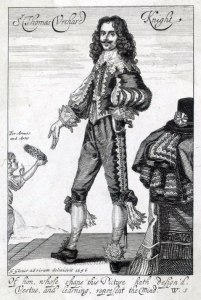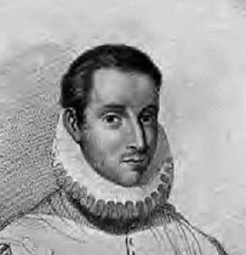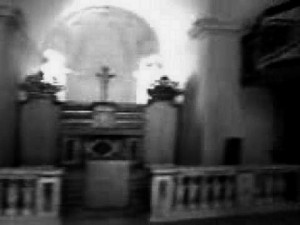Tags
Bannockburn, Clan Urquhart, George Garrett, ghosts, Mantua, novels, Sir Thomas Urquhart, the Admirable Crichton
 Once upon a time, I received a strange call from a lady with a German accent, who desired to know if she could speak with the author of Lo Specchio Convesso – that is to say, The Convex Mirror, my first published novel. On being told that not only she could, but she was doing it already – the lady introduced herself as a researcher for the Clan Urquhart.
Once upon a time, I received a strange call from a lady with a German accent, who desired to know if she could speak with the author of Lo Specchio Convesso – that is to say, The Convex Mirror, my first published novel. On being told that not only she could, but she was doing it already – the lady introduced herself as a researcher for the Clan Urquhart.
“The descendants of Sir Thomas?” asked I, entirely astounded. Because, you see, Sir Thomas was an adventurer and scholar in Seventeenth Century Scotland and, incidentally, a character in my novel…
“Yes, yes, yes!” enthused the lady at the other end. “And I found your book at the library, but it seems it can’t be bought, and I must, must, must have a copy.”
Now, you see, the novel had been published by a very tiny publisher, and quickly gone out of print… So I was thrilled: it’s not everyday that your characters’ descendants send a researcher to chat about your old novels… And yes, there was the chance that the researcher meant to cut my work into ribbons over some minor inaccuracy… But I didn’t think so and, on the whole, I was willing to risk it.
So the German lady and I arranged to meet in town, and spent a happy hour  exchanging anecdotes about Sir Thomas – until Martine expressed her certainty that our gentleman must have been in Mantua. “Which,” she sad beaming, “your book must certainly prove.”
exchanging anecdotes about Sir Thomas – until Martine expressed her certainty that our gentleman must have been in Mantua. “Which,” she sad beaming, “your book must certainly prove.”
Uh-oh.
I explained that my book was centered around the Admirable Crichton, and there appeared a young Tom Urquhart, who never set foot in Mantua – which proved exactly nothing, it being, you know, a novel. “We know precious little of his foreign travels, and I took liberties with the holes…”
But Martine was unshakeable. It couldn’t be by sheer chance that I, an Italian in Mantua, had taken it into my head to write about such a relatively obscure Scottish character. It was obvious that I was onto something. Why couldn’t a fictional invention lead to discover some historical fact? It was her opinion that Sir Thomas himself must have whispered something to me.
I smiled at the notion – until I realised that Martine was in dead earnest. We fondly believe, she informed me, that we write history and historical fiction of our own accord – but in fact, it is because the dead inspire, guide and spur us… And she told me a rather long-winded story of how she’d visited the battlefield of Bannockburn before writing her essay on the battle, and the spirits of so many dead had whispered to her all the relevant information. It was like having a conversation with Delia Bacon.
 But (or perhaps “and”) by then, we were visiting the small church where the Admirable Crichton is not-quite-buried – and let me tell you: the experience was a little eerie. And I’m a skeptic when it comes to things preternatural – but at the moment it was not so very difficult to imagine, if not Sir Thomas, young James Crichton sitting in the shadows, waiting to whisper his story…
But (or perhaps “and”) by then, we were visiting the small church where the Admirable Crichton is not-quite-buried – and let me tell you: the experience was a little eerie. And I’m a skeptic when it comes to things preternatural – but at the moment it was not so very difficult to imagine, if not Sir Thomas, young James Crichton sitting in the shadows, waiting to whisper his story…
Ah well. From Martine, traveller, researcher, polyglot and half-medium, I never heard again after that one surreal afternoon. She never wrote to tell me what she thought of the novel – as she had promised – but I’m not entirely surprised. It’s a nice novel, if I say so myself, but if Sir Thomas had whispered it to me, it did very little to support Martine’s theories about the man. What remains of that day, in the end, is a rather peculiar experience, and an idea for a story that, sooner or later, I will write.
And, if truth be told, a never more than half-serious temptation, whenever I sit down to write after sunset, to quote George Garrett to no one in particular:
Bear with me, ghosts…
Speak to me.
Speak through me.
Speak to us.

You seem to discount another possibility – that your friend Martine was the ghost.
First a voice on the telephone, then brief company for a single afternoon.
Mario Soldati used to say that ghost do not dwell in darkness, but in twilight…
LikeLike
This, now… this I had not considered. Nice twist. I’m not quite sure why a ghostly Martine should visit me – but nice twist indeed.
Is this a ghost story that I see before me? 😀
LikeLiked by 1 person
She’s a writer with a story to tell, she needs some other writer to pass her story along, in order to settle what she left half-finished and finally be released from her twilight existence.
Now go and write it! 😉
LikeLike